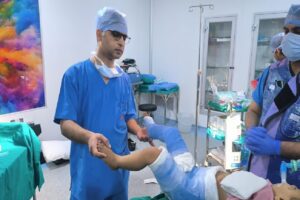How After pain associated with surgery

Surgery involves removing or shrinking the tumor during an operation. the manipulations carried out inside the body, anxiety, immobilization, the withdrawal of a drain or the installation of a probe.
The pain associated with surgery varies according to the person, the operated area, the technique used and the importance of the operation.
POSTOPERATIVE PAIN
Immediately after the intervention, so-called postoperative pain is systematic. They must therefore be prevented and treated. They are due to several factors: the incision of the skin, the manipulations carried out inside the body, anxiety, immobilization, the withdrawal of a drain or the installation of a probe.
These are sharp pains. They disappear in a few days or a few weeks, the time that the healing is complete.
Postoperative pain is better and better controlled.
However, if you have pain following an operation, report it to the healthcare team. Postoperative pain should be treated promptly.
If they persist, they may slow your recovery and become chronic. They are then more difficult to treat.
NEUROPATHIC PAIN
Surgery damages or severs nerve structures. It can then lead to neuropathic pain.
See How to explain the onset of pain
The risk of neuropathic pain relates in particular to operations on the breast, neck and lungs, or limb amputation.
In the context of breast surgery, for example, the removal of lymph nodes can cause neuropathic pain in the arm. Patients experience numbness, tingling, or other “strange sensations” in the arm, shoulder, or hand. These pains are stabbing or continuous. The arm becomes heavy, very sensitive and weak.
Neuropathic pain caused by surgery is not immediate. They appear a few weeks, a few months, or even years after the intervention. These pains are unpredictable: sometimes, the section of the nerves causes no pain.
Other times, the simple incision of the skin (which contains small nerves) is enough to trigger them. These pains require long-term treatment. They are considered as sequelae of the surgery.
PREPARE BEFORE THE PROCEDURE
Scientific studies show that people feel less pain after an operation when they have been warned in advance of possible pain and the means available to relieve it.
To prepare for the procedure, here are some examples of questions you can ask your doctor, surgeon or anesthesiologist:
It is important to report, even long after the operation, any pain in the operated part of the body. The reappearance of pain may possibly be a sign of a recurrence of the disease.






